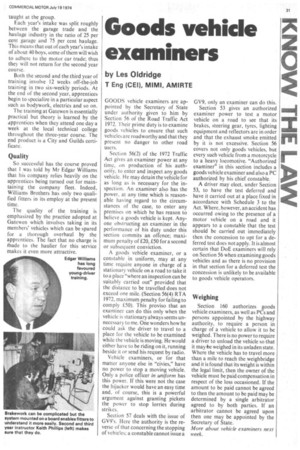Goods vehicle examiners
Page 33

If you've noticed an error in this article please click here to report it so we can fix it.
by Les Oldridge
T Eng (CEI), MIMI, AMIRTE
GOODS vehicle examiners are appointed by the Secretary of State under authority given to him by Section 56 of the Road Traffic Act 1972. Their prime duty is to examine goods vehicles to ensure that such vehicles are roadworthy and that they present no danger to other road users.
Section 56(2) of the 1972 Traffic Act gives an examiner power at any time, on production of his authority. to enter and inspect any goods vehicle. He may detain the vehicle for as long as is necessary for the inspection. An examiner also has the power. at any time which is reasonable having regard to the circumstances of the case, to enter any premises on which he has reason to believe a goods vehicle is kept. Anyone obstructing an examiner in the performance of his duty under this section commits an offence; maximum penalty of £20, £50 fora second or subsequent conviction.
A goods vehicle examiner, or a constable in uniform, may at any time require anyone in charge of a stationary vehicle on a road to take it to a place "where an inspection can be suitably carried out" provided that the distance to be travelled does not exceed one mile. (Section 56(4) RTA 1972, maximum penalty for failing to comply £50). This proviso that an examiner can do this only when the vehicle is stationary always seems unnecessary to me. One wonders how he could ask the driver to travel to a place for the vehicle to be examined while the vehicle is moving. He would either have to be riding on it, running beside it or send his request by radio.
Vehicle examiners, or for that matter anyone else in "civies," have no power to stop a moving vehicle. Only a police officer in uniform has this power. If this were not the case the hijacker would have an easy time and, of course, this is a powerful argument against granting ,pickets the power to stop lorries during strikes.
Section 57 deals with the issue of GV9's. Here the authority is the reverse of that concerning the stopping of vehicles; a constable cannot issue a GV9, only an examiner can do this.
Section 53 gives an authorized examiner power to test a motor vehicle on a road to see that its brakes, steering gear, tyres, lighting equipment and reflectors are in order and that the exhaust smoke emitted by it is not excessive. Section 56 covers not only goods vehicles, but every such vehicle from a motorcycle to a heavy locomotive. "Authorized examiner" in this section includes a goods vehicle examiner and also a PC authorized by his chief constable.
A driver may elect, under Section 53, to have the test deferred and have it carried out at a place fixed in accordance with Schedule 3 to the Act. Where, however, an accident has occurred owing to the presence of a motor vehicle on a road and it appears to a constable that the test should be carried out immediately then the concession to opt for a deferred test does not apply. It is almost certain that DoE examiners will rely on Section 56 when examining goods vehicles and as there is no provision in that section for a deferred test the concession is unlikely to be available to goods vehicle operators.
Weighing
Section 160 authorizes goods vehicle examiners, as well as PCs and persons appointed by the highway authority, to require a person in charge of a vehicle to allow it to be weighed. There is no power to require a driver to unload the vehicle so that it may be weighed in its unladen state. Where the vehicle has to travel more than a mile to reach the weighbridge and it is found that its weight is within the legal limit, then the owner of the vehicle must be paid compensation in respect of the loss occasioned. If the amount to be paid cannot be agreed to then the amount to be paid may be determined by a single arbitrator agreed to by both parties. If an ,arbitrator cannot be agreed upon then one may be appointed by the Secretary of State.
More about vehicle examiners next week.








































































































